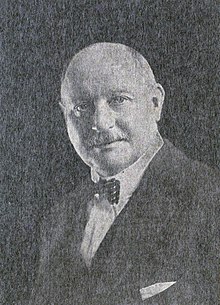Harcourt Butler
Sir Harcourt Butler | |
|---|---|
 | |
| Governor of Burma | |
| In office 2 January 1923 – 20 December 1927 | |
| Preceded by | Office established |
| Succeeded by | Charles Alexander Innes |
| Lieutenant Governor of Burma | |
| In office 21 December 1922 – 2 January 1923 | |
| Preceded by | Reginald Craddock |
| Succeeded by | Office dissolved |
| Lieutenant Governor of Burma | |
| In office 28 October 1915 – 22 September 1917 | |
| Preceded by | George Shaw |
| Succeeded by | Walter Francis Rice |
| Personal details | |
| Born | 1 August 1869 Cambridge, Cambridgeshire, England |
| Died | 2 March 1938 (aged 68) Camden, London, England |
| Spouse | Amelia Katherine Florence Wright |
| Relations | Montagu Sherard Dawes Butler Harry Nelson Wright (brother-in-law) |
| Children | 1 |
| Alma mater | Harrow School, Balliol College, Oxford |
| Occupation | Administrator |
Sir Spencer Harcourt Butler GCSI, GCIE, DL, FRGS, FRSA, FRAS, FZS (1 August 1869 – 2 March 1938) was an officer of the Indian Civil Service who was the leading British official in Burma for much of his career, serving as Lieutenant-Governor (1915–17 and 1922–23) and later Governor of Burma (1923–27).
He also served as Lieutenant Governor of the United Provinces of Agra and Oudh from 1918 to 1921 and later was the first governor of United Provinces of Agra and Oudh from 1921 to 1922.[1]
Life and career
[edit]Butler was born on 1 August 1869 in Middlesex, England and died on 2 March 1938 in London, at age 68. He was the brother of Montagu Sherard Dawes Butler and Geoffrey G. Butler.[citation needed]
Educated at Harrow School and Balliol College, Oxford, Butler entered the Indian Civil Services soon afterwards, in 1890. He served as governor of United Provinces from 3 January 1921 to 21 December 1922, and was followed by Sir William Sinclair Marris. Butler later went on to serve as Governor of Burma from 2 January 1923 to 20 December 1927; he had already been lieutenant-governor of Burma from 28 October 1915 to 22 September 1917, and held the title briefly again from 21 December 1922 to 2 January 1923. On that date, the position became that of "Governor".
The Government of India in 1910 had appointed Butler as the first Member for Education with a seat on the Viceroy's Executive Council.[2] He was also the first president of Delhi Gymkhana, founded in 1913.[3]
Butler was appointed a Companion of the Order of the Star of India (CSI) in 1909, knighted as a Knight Commander (KCSI) of the same order in 1911, and promoted to Knight Grand Commander (GCSI) of the order in 1928. He was appointed a Companion of the Order of the Indian Empire (CIE) in November 1901,[4] and was promoted to a Knight Grand Commander (GCIE) of the same order in 1923.[citation needed]
The Harcourt Butler Technological Institute, Kanpur established in 1921 was named after him which was granted a university status in September 2016.[citation needed] Also Harcourt Butler Higher Secondary School (now known as Harcourt Butler Sr. Sec. School), New Delhi was also named after him in 1917.Harcourt Butler Sr. Sec. School It was earlier called Bengali Boys School.[citation needed]
Butler helped the opening of the University of Medicine 1, Yangon, on 2 February 1927. From 1927 to 1929 he chaired the Butler Committee on the governance of the British Raj in relation to the princely states.[5]
Family
[edit]Butler married Florence Katherine Wright[6] in London in 1894. They had one son, Victor Spencer, born in 1900.[7]
References
[edit]- ^ The India Office List. Secretary of State for India in Council. 1927. p. 530.
- ^ Riddick, John F. (2006). The History of British India: A Chronology. Greenwood Publishing Group. p. 166. ISBN 978-0-313-32280-8.
- ^ "A fine balance of luxury and care". Hindustan Times. 21 July 2011. Archived from the original on 27 November 2011.
- ^ "No. 27374". The London Gazette (Supplement). 9 November 1901. p. 7288.
- ^ Robinson, Francis. "Butler, Sir (Spencer) Harcourt". Oxford Dictionary of National Biography (online ed.). Oxford University Press. doi:10.1093/ref:odnb/32218. (Subscription or UK public library membership required.)
- ^ "The Descendants of William Wright, circa 1830, probably from Windsor in Berkshire".
- ^ Gilmour, David (2006). The Ruling Caste. New York: Farrar, Straus and Giroux. p. 281.
Links
[edit]- "About Harcourt Butler". National Informatics Centre, Uttar Pradesh State Unit. Archived from the original on 6 February 2012. Retrieved 29 March 2016.
- Myanmar (Burma), worldstatesmen.org. Retrieved 29 March 2016.
- Speeches 1921
- 1869 births
- 1938 deaths
- Knights Grand Commander of the Order of the Star of India
- Knights Grand Commander of the Order of the Indian Empire
- Knights of the Order of St John
- Administrators in British Burma
- Alumni of Balliol College, Oxford
- Indian Civil Service (British India) officers
- People educated at Harrow School
- People from Kanpur
- British people in colonial India
- Montagu Butler family
